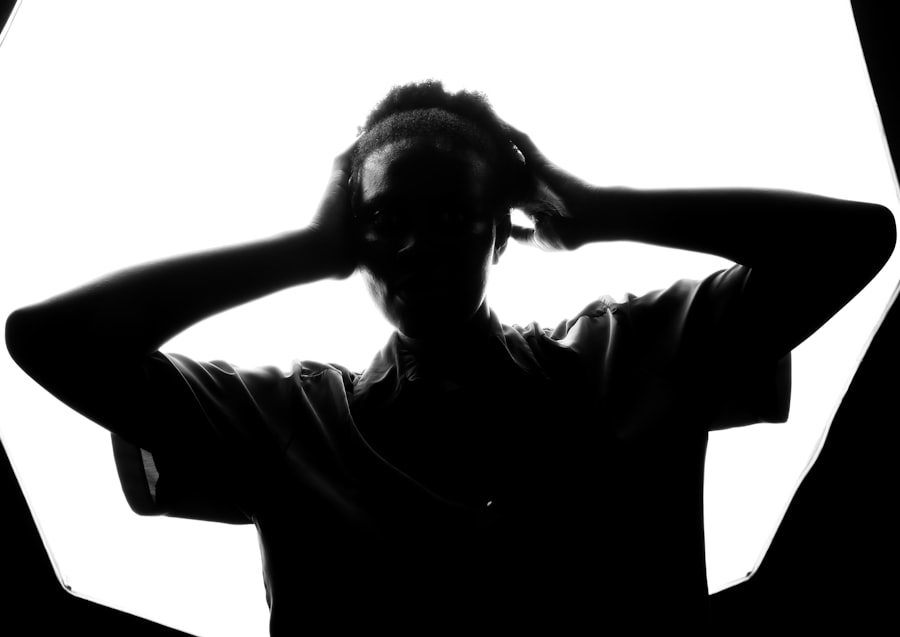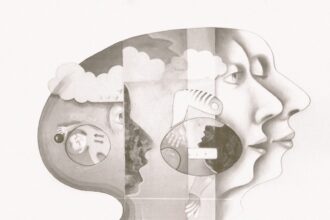Depersonalization Derealization Syndrome (DPDR) is a complex psychological condition that can leave you feeling detached from your own thoughts, feelings, and sense of self. Imagine looking at yourself in a mirror and not recognizing the person staring back at you; this is a common experience for those who suffer from DPDR. It is characterized by persistent or recurrent feelings of depersonalization—where you feel disconnected from your body or thoughts—and derealization, where the world around you seems unreal or distorted.
This syndrome can be disorienting and frightening, often leading to significant distress and impairment in daily functioning.
It is essential to understand that this condition is not merely a fleeting feeling; it can persist for extended periods, sometimes even years.
For many, the sensation of being an observer in their own life can lead to confusion and a sense of isolation. You may find yourself questioning your reality and struggling to connect with those around you, which can exacerbate feelings of loneliness and despair. Understanding the nature of DPDR is the first step toward addressing its impact on your life.
Key Takeaways
- Depersonalization Derealization Syndrome is a mental health condition characterized by feeling detached from oneself and the surrounding environment.
- Symptoms of Depersonalization Derealization Syndrome include feeling like an outside observer of one’s thoughts and actions, experiencing a sense of unreality, and feeling emotionally numb.
- Causes and risk factors for Depersonalization Derealization Syndrome may include trauma, stress, anxiety, and substance abuse.
- Diagnosis and assessment of Depersonalization Derealization Syndrome involve a thorough evaluation of symptoms, medical history, and ruling out other potential causes.
- Treatment options for Depersonalization Derealization Syndrome may include therapy, medication, and lifestyle changes to manage symptoms and improve quality of life.
Symptoms of Depersonalization Derealization Syndrome
The symptoms of Depersonalization Derealization Syndrome can vary widely from person to person, but they generally fall into two main categories: depersonalization and derealization. When experiencing depersonalization, you might feel as though you are watching yourself from outside your body or that your thoughts are not your own. This sensation can create a profound sense of alienation, making it difficult for you to engage with your emotions or understand your identity fully.
You may also experience a sense of numbness or emotional detachment, which can be particularly distressing. On the other hand, derealization involves a distorted perception of the world around you. You might perceive your surroundings as foggy, dreamlike, or unreal.
Everyday objects may seem unfamiliar or distorted, leading to confusion and anxiety. These symptoms can be overwhelming and may lead you to avoid situations that trigger them, further isolating you from friends and family. The combination of these symptoms can create a cycle of fear and avoidance that complicates your ability to lead a fulfilling life.
Causes and Risk Factors for Depersonalization Derealization Syndrome

Understanding the causes and risk factors associated with Depersonalization Derealization Syndrome is crucial for recognizing its onset and seeking appropriate help. While the exact cause remains unclear, several factors have been identified as potential contributors. High levels of stress or trauma—such as experiencing abuse, accidents, or significant life changes—can trigger episodes of DPDR.
If you have a history of anxiety or mood disorders, you may also be at a higher risk for developing this syndrome. Additionally, certain personality traits may predispose you to experience depersonalization and derealization. For instance, individuals who are highly sensitive or prone to anxiety may find themselves more susceptible to these feelings during stressful situations.
Substance use can also play a role; some people report experiencing DPDR symptoms after using drugs or alcohol. Understanding these risk factors can empower you to take proactive steps in managing your mental health and seeking support when needed.
Diagnosis and Assessment of Depersonalization Derealization Syndrome
| Diagnosis and Assessment of Depersonalization Derealization Syndrome |
|---|
| 1. Clinical interviews |
| 2. Self-report questionnaires |
| 3. Structured interviews |
| 4. Observation of symptoms |
| 5. Psychological assessment |
Diagnosing Depersonalization Derealization Syndrome typically involves a comprehensive assessment by a mental health professional. During this process, you will likely be asked about your symptoms, their duration, and any potential triggers. It is essential to provide detailed information about your experiences so that the clinician can differentiate DPDR from other mental health conditions that may present similar symptoms, such as anxiety disorders or post-traumatic stress disorder (PTSD).
In some cases, standardized questionnaires may be used to assess the severity and frequency of your symptoms. These tools can help the clinician gauge how DPDR affects your daily life and overall well-being. A thorough evaluation will also consider any co-occurring mental health issues that may need to be addressed alongside DPDR.
By understanding the full scope of your experiences, the clinician can develop a tailored treatment plan that meets your specific needs.
Treatment Options for Depersonalization Derealization Syndrome
When it comes to treating Depersonalization Derealization Syndrome, there is no one-size-fits-all approach. Treatment options often include psychotherapy, medication, or a combination of both. Cognitive-behavioral therapy (CBT) has shown promise in helping individuals manage their symptoms by addressing negative thought patterns and developing coping strategies.
Through therapy, you can learn to reframe your experiences and gradually reconnect with your sense of self. In some cases, medication may be prescribed to help alleviate symptoms associated with anxiety or depression that often accompany DPDR. Antidepressants or anti-anxiety medications may be considered based on your specific situation.
It is important to work closely with your healthcare provider to monitor the effectiveness of any prescribed treatment and make adjustments as necessary. Finding the right combination of therapies can take time, but with persistence and support, many individuals find relief from their symptoms.
Impact of Depersonalization Derealization Syndrome on Daily Life

The impact of Depersonalization Derealization Syndrome on daily life can be profound and far-reaching. You may find that simple tasks become overwhelming when accompanied by feelings of detachment or unreality. Engaging in social situations might feel daunting as you struggle to connect with others or express your emotions authentically.
This disconnection can lead to strained relationships with friends and family, as they may not fully understand what you are experiencing. Moreover, the persistent nature of DPDR can affect your ability to work or pursue hobbies that once brought you joy. You might find it challenging to concentrate on tasks or make decisions due to the foggy perception of reality that accompanies this syndrome.
The fear of experiencing depersonalization or derealization in public settings may lead you to avoid certain situations altogether, further isolating yourself from opportunities for connection and fulfillment.
Coping Strategies for Depersonalization Derealization Syndrome
Developing effective coping strategies is essential for managing the symptoms of Depersonalization Derealization Syndrome. One approach is grounding techniques, which help anchor you in the present moment when feelings of detachment arise. Simple practices such as focusing on your breath, engaging in physical activity, or using sensory experiences—like holding an object with texture—can help bring you back to reality when you feel disconnected.
Mindfulness practices can also be beneficial in cultivating awareness and acceptance of your experiences without judgment. By learning to observe your thoughts and feelings without becoming overwhelmed by them, you can create a sense of distance from the distressing sensations associated with DPDR. Journaling about your experiences may also provide insight into triggers and patterns, allowing you to develop greater self-awareness over time.
Seeking Support for Depersonalization Derealization Syndrome
Seeking support is a vital step in managing Depersonalization Derealization Syndrome effectively. Connecting with mental health professionals who understand this condition can provide you with valuable resources and coping strategies tailored to your needs. Support groups—whether in-person or online—can also offer a sense of community where you can share experiences with others who understand what you’re going through.
Additionally, reaching out to friends and family members about your experiences can foster understanding and support in your personal relationships. Educating those close to you about DPDR can help them better comprehend what you’re facing and how they can assist you during difficult times. Remember that you are not alone in this journey; there are people who care about you and want to help you navigate the challenges associated with this syndrome.
By implementing coping strategies and seeking support from professionals and loved ones alike, you can work toward reclaiming a sense of connection with yourself and the world around you.
Depersonalization-derealization syndrome is a dissociative disorder characterized by persistent or recurrent feelings of detachment from one’s body or surroundings, as if one is an outside observer of their own life. This condition is recognized in the DSM-5 and can significantly impact an individual’s daily functioning and quality of life. For those interested in exploring more about this syndrome and its implications, a related article can be found on Unplugged Psych. This resource provides valuable insights into the nature of depersonalization-derealization syndrome and its treatment options. You can read more about it by visiting this article.
LEARN MORE About Depersonalization & Derealization
FAQs
What is depersonalization-derealization syndrome?
Depersonalization-derealization syndrome is a mental health condition characterized by feeling detached from oneself (depersonalization) and feeling detached from the surrounding environment (derealization).
What are the symptoms of depersonalization-derealization syndrome?
Symptoms of depersonalization-derealization syndrome may include feeling like an outside observer of one’s thoughts, feelings, and body, feeling like the world is unreal or distorted, and experiencing emotional or physical numbness.
What causes depersonalization-derealization syndrome?
The exact cause of depersonalization-derealization syndrome is not fully understood, but it is believed to be related to a combination of biological, psychological, and environmental factors. It can be triggered by trauma, stress, anxiety, or substance abuse.
How is depersonalization-derealization syndrome diagnosed?
Depersonalization-derealization syndrome is diagnosed based on a thorough psychiatric evaluation, including a discussion of symptoms, medical history, and ruling out other potential causes. There is no specific diagnostic test for this condition.
What is the treatment for depersonalization-derealization syndrome?
Treatment for depersonalization-derealization syndrome may include psychotherapy, medication, and stress management techniques. There is no specific medication approved for this condition, but certain antidepressants or anti-anxiety medications may be prescribed.
Is depersonalization-derealization syndrome recognized in the DSM-5?
Yes, depersonalization-derealization syndrome is recognized in the DSM-5 (Diagnostic and Statistical Manual of Mental Disorders, Fifth Edition) as a dissociative disorder. It is listed as depersonalization/derealization disorder.




